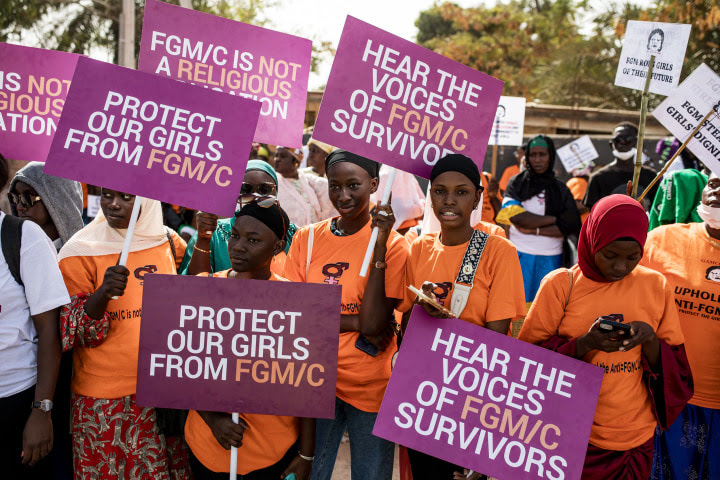BY TONY ERHA
Although it is widely thought to have been outlawed and society now has a sigh of relief, “Female Genital Mutilation” (FGM) is still secretly and defiantly practiced in traditional Nigerian communities.
In Edo, a frontline state of Africa’s most populous country, with a sorbriquet of “Heartbeat of the Nation”, it is true to its description that most happenings in the state, are often fashionable across the country’s 36 states and Abuja Federal Capital Territory (FCT). In the state, where traditional practice still run very deep, it wouldn’t be farfetched that FGM is still practiced by some ‘midnight’ groups and individuals, across the nation, added that the country of about 500 ethnic groups mostly have similar cultural antecedents that entrench the FGM scourge.
The Wikipedia online encyclopedia says Nigeria has the highest rate of FGM practice in the world. FGM is usually experienced by girls aged 0 to 15 years old. And it involves either partial or complete removal (by cutting off) the vulva or other injury to the female genital organs, which has no proven medical benefit, but a process which causes excruciating pains and medical complications, and in cases, deaths.
But, practitioners and proponents of it would readily profess that it is an agelong traditional ritual called circumcision, which can’t be jettisoned, as it conforms with the dictate of traditional deities. And with the females, cultural traditional upholds that circumcision of females greatly reduce sexual promiscuity and its pervasity admist the female folks.
Unsettled by the medical and social implications and complexity of the practice, which are harmful to the females and societal, at large, FGM had prodded all and sundry to a roundtable and the need to expunge the original name of “Female Circumsticion” (FC) to Female Genital Mutilation (FGM). And humankind had had to take to concreted steps to stamp out FGM, as well as other unhealthy cultural practices that retard womanhood and society.
Still disturbed by the prevalence of the practice, instead of being wiped out, the Edo State Government was again moved to official comments about the FGM in the state. During the 2024 commemoration of the International Day of Zero Tolerance for Female Genital Mutilation, Correspondent Oginni Joy Kehinde, reported the State Government as reiterating “its commitment to a total crusade to end female genital mutilation and other women-related harmful practices in the state.”
Amongst the public gathering, where the State Government made the declaration, speakers had spoken in the same vein;
“FGM is a violation of the human rights of girls and women. It reflects deep-rooted inequality between the sexes and constitutes extreme form of discrimination against girls and women…”. Declared Fatima Ukwa, a female activist and medical doctor.
In Edo, like it is nationwide, the pains, severe medical conditions and occasional deaths of victims of FGM are not the only afflictions victims and their relations suffer. But situations abound, where victims and their relations are met with lethal threats, banishment, bodily attacks and persecutions, by the diehard female genital multilators and their supportive groups and powerful individuals. Also, anti-campaigners of FGM often face threats, bodily attacks and deaths.
For instance, in Taraba, the fringe-state of the Nigeria’s north east geopolitical zone, a peasant family of Winika Danjuma, was summarily banished from a Buruku-Donga community, because the family refused to succumb to the circumsticion of their three years old daughter. The family was initially excommunicated before they were thrown out of the village.
In 2017 or thereabout, Enosogbe T. Okaisabor, from Benin, the Edo State capital, where he then plied his profession of journalism, was similarly locked in a grim battle for survival, when his only girl-child, Osereme Okaisabor, was mandated to undergo the circumcision pains by the “Osekes”, his local community’s name for FGM practitioners and the supportive groups and individuals. The insistence of the ‘Osekes’, was that the unbroken tradition of an Edo’s deity must be obeyed, and that all female children, born into the villages of the environs must comply, so as to prevent the wrath of the gods, hence failure to do so calls for the banishment of those girl-children victims and their parents.
Sandra Okaisabor, the biological mother of baby-girl Okaisabor, no matter how long she tried to defy and terminate the obnoxious agelong circumcision rituals, wasn’t successful at it. Mother Okaisabor, the baby girl’s mother, a professional nurse, who knows the deadly implications of FGM, had to flee the aboriginal village of her baby and husband, and from the reach of deadly cult groups and individuals, who have tentacles to cause mayhem to those who defy their orders.
But, a group of thought believe that the only way to stamp out FGM was for a separate body to be set for its eradication, like the National Agency for Trafficking In Persons (NATIPS), which has fought human trafficking headlong to eradicate it. FGM, it is believed, can’t be left in the hands of Women ministries of the tier of government, that are already saturated with duties.
Tony Erha, a journalist and rights activist, write from Abuja, FCT




